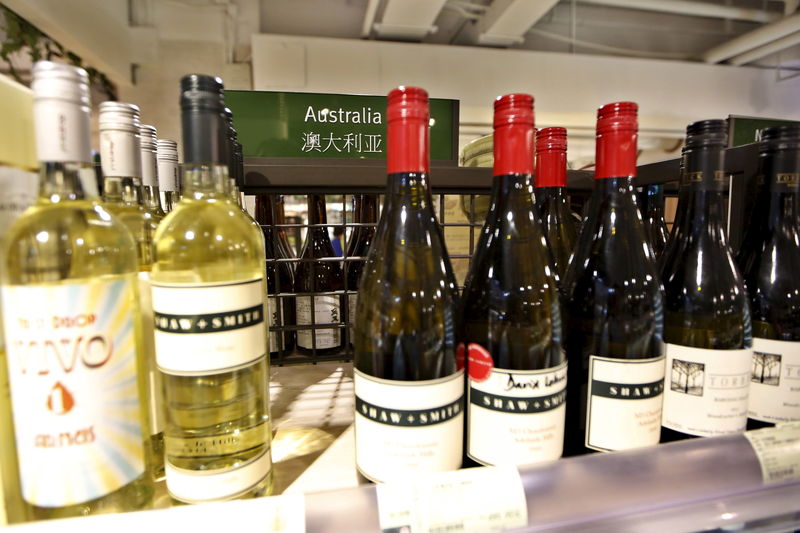By Colin Packham
SYDNEY (Reuters) - Australian farmers Rob and Jill Baker started growing native finger limes almost a decade ago. Today, top restaurants across Asia and Europe can't get enough of the fruit known as "citrus caviar" due to the burst of tangy flavour when chewed.
Finger limes are just one of a number of premium Australian agricultural products, including olive oil, honey, wagyu beef and organic baby food, now being sold in some of Asia's top stores as Australia pushes to become Asia's delicatessen.
While Australia's main agricultural products like wheat, rice, sugar and beef have traditionally fed Asia, there is now a wave of farmers like the Bakers moving to premium crops.
"Australia can meet only a small percentage of Asia's current food demand – let alone its future demand. That suggests that our opportunity isn't so much to be the supermarket to Asia as its delicatessen – offering high-value, high-margin products," said Rob McConnel, Deloitte agribusiness lead.
The Australian Council of Learned Academies forecasts the value of all food exports doubling to A$710 billion (332 billion pounds) by 2050.
International demand for Australia's finger limes, an ancient Aboriginal food and now a delicacy for Asia's growing middle class, is pushing prices as high as A$40 to A$60 a kilo. "Chefs love them. They cover the three components of a modern dish, texture, visually they are very pretty as they look like caviar, and they give a dish an acid component," said daughter Jacquie Baker, who oversees the sale of finger limes.
"In modern food, especially Asian, you need an acid element," explained Baker.
However, Australian farmers must overcome a lack of brand awareness in Asia, compared with established premium products from nations like France, to tap this lucrative market.
"Products in a delicatessen are considered to be worth the extra expense because they are brand name products with a good, well-established reputation for being 'better' than the average product," says the Australian Farm Institute.
And despite China's estimated 4 million millionaires, the slowing growth of the world's second-biggest economy could cast a cloud over Australia's "Asian delicatessen" policy.
VOGUE CROPS SPREADING
This season, a record amount of chickpeas and lentils have been planted, alongside vogue products such as chia seeds and quinoa at the expense of traditional crops.
Ten years ago the irrigated Ord Valley in Australia's far northwest was dominated by sugar farming, but today it is the world's largest producer of the South American crop chia, driven by former wheat farmer John Foss.
His Chia Co now exports to 36 countries and Chinese regulators last year granted it permission to sell into mainland China.
Global sales of chia, a nutrient-rich seed popular in smoothies and snack foods, are forecast to reach A$1.1 billion by 2020 due to demand for its use in cereals, snacks and beverages, according to a 2013 report by Food Navigator.
Australia's Capilano Honey has seen strong demand from Asia, particularly for its Mānuka honey that is often used in alternative medicines for its antibacterial properties.
Manuka honey is native to Australia and New Zealand and with limited supply prices can approach nearly A$150 a kilo in Asia.
"If I feel sick or have a gastric ulcer, then I would immediately go buy the honey in Korean department stores even though the price is almost double," said Korean Su-Jung Bin, shopping at a store where 1 kg (2.2 pounds) of Manuka honey was being offered for 132,000 Korean won (71 pounds).
Capilano doubled its sales to Asia in the year to March 2014 and posted 29 percent growth in sales revenue in Asia in the past year, according to its last two annual reports.
With soaring export demand, the total value of Australia's honey and beeswax production is forecast to hit record levels, having nearly doubled in the last six years to A$107 million (50 pounds).
Australian organic baby food company Bellamy is making inroads into one of Asia's toughest markets, China, and has customers in Hong Kong, Taiwan, Singapore, Malaysia and Vietnam.
At the upmarket IAPM mall in Shanghai's French Concession, Bellamy's Organic infant formula costs a hefty 398 yuan (54 pounds).
Bellamy sells its organic formula range in 160 Wal-mart stores in Guangdong and Guangxi, as well nationally to OLE supermarkets, and have distribution in select regional premium supermarkets and mother-and-baby chains across China.
"We expect that this step into supermarket distribution will contribute to increasing the brand profile in the China market," said Bellamy, a family firm started in 2004 in the island state of Tasmania and now a A$100 million company fuelled largely by fast-growing sales in Asia.
